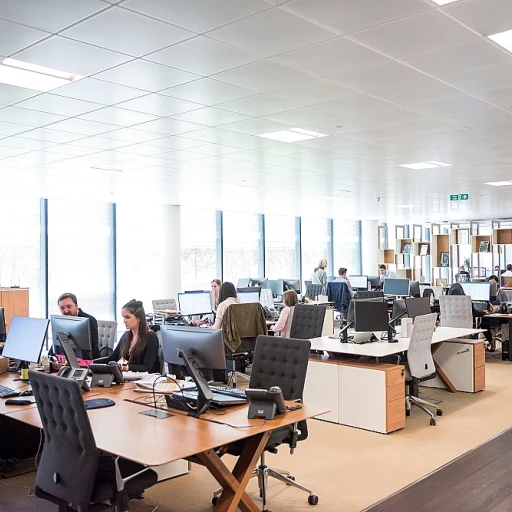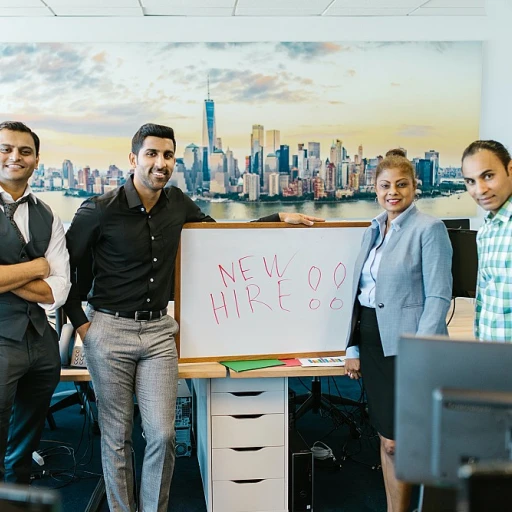
The Evolving Landscape of Manufacturing Staffing
The manufacturing industry is undergoing a significant transformation, reshaping how businesses approach their staffing needs. This shift is driven by a blend of technological advancements, economic changes, and evolving workforce dynamics.
As the industry adapts, companies face a unique set of challenges and opportunities. The key is understanding the evolving landscape of manufacturing staffing, where flexibility and adaptability have become essential. Historically, manufacturing relied heavily on a stable, long-term workforce. However, the tides have changed, with many organizations now opting for temporary staffing solutions to address fluctuations in supply chain demands and evolving market conditions.
Data from the Bureau of Labor Statistics highlights the growing demand for skilled workers in manufacturing, compounded by a noticeable skills gap. This gap presents both a challenge and an opportunity for the sector. While there is an increased need for talent with specialized skills, there is also a push towards skills-based hiring practices that prioritize competency over traditional credentials. Staffing firms and agencies are playing a crucial role in bridging this gap by supplying companies with skilled workers tailored to their specific requirements.
The increased reliance on temporary workers, as well as the demand for flexibility in the industrial labor market, underscores the need for adaptable staffing strategies. Understanding how temporary jobs have evolved in the recruitment industry can provide valuable insights for businesses maneuvering through these changes.
Key Challenges in MSP Staffing for Manufacturing
Addressing the Complexities of Industrial Workforce Needs
The manufacturing industry is a dynamic environment with constant shifts in demand, technology, and regulations. One of the primary challenges in MSP staffing for manufacturing companies is navigating these complexities to effectively fill the gaps in the labor market. Manufacturers are increasingly seeking skilled workers who can adapt to new manufacturing processes and technologies, yet the skills gap persists, making it difficult for companies to find suitable talent. Despite the high demand for workers, the pool of job seekers with the necessary skills remains limited. This shortage is further exacerbated by the rise of light industrial and industrial manufacturing sectors, which often require specific skill sets. Labor statistics highlight the need for temporary staffing solutions that can swiftly adapt to these changes while ensuring a steady supply chain. Staffing firms play an essential role in bridging this gap, offering access to skilled labor and providing the flexibility required by manufacturers. Moreover, the incorporation of technology into manufacturing processes demands a workforce with skills-based expertise. As companies continue to innovate, there's a pressing need for ongoing training and development in workforce skills. This ensures employees are prepared to meet new industrial challenges, enhancing both productivity and job satisfaction. To tackle these MSP staffing challenges, it's crucial to consider long-term strategies that align with business objectives. Recruitment efforts must focus on not only the immediate needs but also anticipate future industry fluctuations. Companies may find it beneficial to partner with staffing agencies that offer specialized industrial staffing services tailored to the nuanced demands of the manufacturing sector. By understanding the intricacies of the labor market and implementing workforce strategies that prioritize skill development and flexibility, manufacturing businesses can better position themselves for sustained growth. For additional insights on boosting workforce agility and enhancing MSP solutions, explore our detailed guide on enhancing workforce agility with MSP solutions.Skills in Demand: What Manufacturing Companies Are Looking For
Skills That Drive Success in the Manufacturing Sector
In the dynamic world of manufacturing, understanding the skills in demand is crucial for companies aiming to stay competitive and efficient. As the industry evolves, manufacturers face an increasing need to adjust their staffing strategies to meet these ever-changing requirements. One of the most critical aspects of staffing within the manufacturing industry is identifying the skills that play a pivotal role in maintaining and boosting productivity. Given the industrial nature of manufacturing, there is a consistent requirement for workers who can adeptly handle machinery, technology, and production processes. Here’s a breakdown of skills that manufacturing companies are actively seeking:- Technical Expertise: With the rise in automation and advanced technologies, there is a high demand for individuals proficient in operating and maintaining industrial equipment.
- Problem-Solving Skills: Manufacturers look for employees who can troubleshoot issues and come up with innovative solutions, ensuring minimal disruptions in the supply chain.
- Adaptability: As the manufacturing landscape shifts, the ability to embrace new technologies and processes becomes invaluable, particularly in addressing skills gaps and workforce challenges.
- Basic Computer Skills: Even in traditional roles such as light industrial staffing, basic tech proficiencies are essential, enabling workers to interface with modern equipment and data systems effectively.
The Role of Technology in Addressing Staffing Needs
The Integration of Modern Technology in Meeting Workforce Demands
The manufacturing industry continues to evolve, and technology plays a crucial role in addressing staffing needs. Automation and digital advancements are shaping how companies hire and manage their workforce.- Data-Driven Staffing Decisions: Manufacturing companies are increasingly relying on data to inform their staffing strategies. By analyzing labor market trends and labor statistics, companies can anticipate staffing demands and prepare for future needs. Staffing agencies and firms are using analytics to better match job seekers with positions that suit their skills and the company's requirements.
- Temporary and Long-Term Staffing Solutions: Technology enables better management of temporary and permanent workforce solutions, ensuring that labor supply aligns with industrial demand. Temporary staffing becomes more efficient with the adoption of scheduling and workforce management software, which helps in placing the right talent at the right time.
- Filling the Skills Gap: With the rise of automation and technological processes, the skills gap in the industrial sector remains a pressing challenge. Technology aids in identifying skilled workers and upskilling the current workforce. Online training platforms and skills-based assessments help manufacturers ensure that their workers are equipped for modern production methods.
- Technology in Hiring and Onboarding: From AI-driven recruitment tools to virtual onboarding processes, manufacturers are implementing technology to streamline hiring. These tools not only help in rapidly sourcing skilled labor but also in reducing the time it takes to bring new workers up to speed with company operations.
Strategies for Effective MSP Staffing in Manufacturing
Implementing Successful Strategies for Workforce Solutions
In the rapidly changing industrial landscape, the importance of effective workforce solutions cannot be overstated. As manufacturing companies strive to meet the increasing demands of the market, they face complex staffing requirements. Crafting strategies that adequately address these challenges is crucial for the seamless operation of the manufacturing industry.
One of the key considerations in developing MSP staffing strategies is understanding the specific needs of industrial manufacturing. This includes identifying the skills gap and wisely bridging it with the help of staffing agencies. Acknowledging these gaps allows companies to pinpoint the required skilled workers the manufacturing industry needs today.
To find the right talent, businesses can partner with industrial staffing firms that specialize in temporary staffing solutions. These agencies have access to a broad pool of job seekers, including those with niche skills that can fill light industrial roles effectively. The ability to recruit temporary workers also grants flexibility to manufacturers, providing them the agility necessary to respond to fluctuations in staffing demands.
Data-driven decision-making is another cornerstone of effective strategy formulation. Companies can utilize labor statistics and insights from the Bureau of Labor to forecast trends in staffing needs, helping them prepare for future demands. By analyzing market data, businesses can better understand labor market dynamics, adjusting their hiring processes to align with the industrial trends.
Furthermore, manufacturers should pursue long-term staffing strategies that not only address immediate needs but also pave the way for future growth. By investing in skills-based training programs for their workforce, companies can cultivate a reservoir of competent employees that the business can rely on. This long-term approach helps in closing the skills gap, ensuring a ready supply of qualified people as per the demands of the industry.
Lastly, it is vital for manufacturing companies to build a robust relationship with their staffing firms. Effective communication and regular feedback loops can help in delivering tailored staffing solutions that meet specific business needs. These strategic partnerships result in a more adaptable and resilient labor force, capable of meeting both current and future manufacturing challenges.
In conclusion, successfully navigating the staffing landscape requires companies to harness a variety of approaches—from temporary staffing to data analysis and skills development. This multi-faceted strategy will ensure that manufacturers remain competitive while fulfilling their workforce requirements efficiently.
Future Trends in Manufacturing Staffing
The Future Landscape of Manufacturing Workforces
The manufacturing industry's staffing landscape is poised for significant transformations in the coming years. Manufacturers are adapting to changes in the global labor market and leveraging innovative strategies to tackle emerging challenges.- Rise of Highly Skilled Workers: As technology continues to advance, specialized skills in demand will grow. Manufacturers are increasingly looking for workers who can navigate complex machinery and automated processes, indicating a shift towards skills-based hiring practices.
- Role of Staffing Agencies and Solutions: With the growing reliance on temporary staffing to meet fluctuating demands, staffing agencies are stepping up as essential partners. They provide manufacturers with flexibility, light industrial staffing options, and access to a broader pool of talent, helping bridge the skills gap efficiently.
- Technology Integration: Embracing technology in the staffing process, manufacturers can utilize data analytics to understand labor statistics and workforce trends. This approach helps identify the skills in demand, predict future labor needs, and streamline the hiring process.
- Adaptation to New Economic Conditions: As supply chain dynamics shift, manufacturing companies must remain agile. By partnering with staffing firms, they can rapidly adjust their workforce tactically in response to emerging trends in the labor market.













